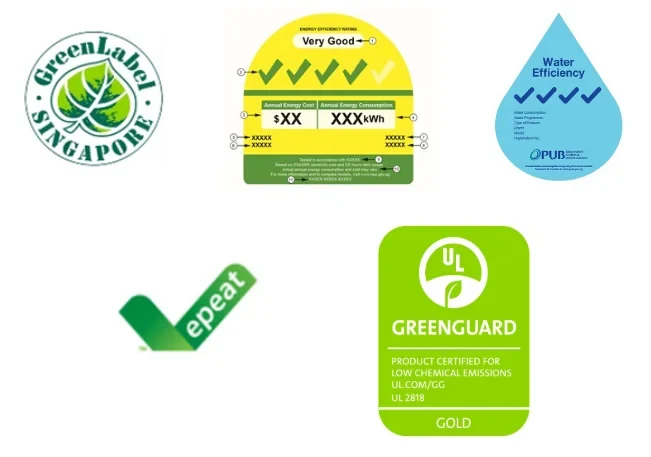
Eco-labels in Singapore: How aware are consumers of these green certification marks?
Environmental labelling certifications and eco-labels have made it simpler for consumers today to identify products that are manufactured and/or can be used with lower environmental impact.
But how aware are consumers in Singapore of these green marks? Ahead of Earth Day on April 22, latest research from YouGov throws a spotlight on this.
Eco-label awareness in Singapore: Common green marks

YouGov polled consumers on their familiarity with five eco-labels used in Singapore. They included the:
- Singapore Green Label for industrial and consumer products that are produced in an environmentally-friendly manner
- NEA Energy Label which uses a 1-5 tick rating to grade the energy efficiency level of various electrical products
- PUB Water Efficiency Label which uses a 0-3 tick rating to grade the water efficiency level of various products that contain water fittings
- EPEAT (Electronic Product Environmental Assessment Tool) which uses a bronze/silver/gold system to assess the environmental impact of producing, using and recycling various electronic products
- UL GREENGUARD for products certified to emit lower levels of airborne chemicals or volatile organic compounds (VOCs), reducing the risk of indoor air pollution and chemical exposure
Eco-label awareness in Singapore: General population
Latest data from YouGov RealTime Omnibus, as of April 2022, reveals that more than nine in ten consumers in Singapore are aware of the NEA Energy Label (95%) and PUB Water Efficiency Label (96%), of which more than one-third are “very familiar” and more than half are “quite” or “slightly familiar” with each label.
More than three-fifths are also aware of the Singapore Green Label (63%), but less than one-third recall ever seeing the EPEAT Label (29%) and UL GREENGUARD Label (22%).
Eco-label awareness in Singapore: Across age groups
The youngest consumers aged 18-24 years are much more likely than other age groups to be very familiar with the NEA Energy Label (55%) and PUB Water Efficiency Label (47%), while consumers aged 25-34 years were most likely to be very familiar with the EPEAT (9%) and UL GREENGUARD Labels (8%).
However, with the Singapore Green Label, while consumers aged 25-44 years were most likely to be familiar (11%), consumers aged 18-24 years were least likely to be familiar (3%).
Consumers aged 55+ years are more likely than other age groups to be completely unfamiliar with the NEA Energy Label (9%), EPEAT Label (80%) and UL GREENGUARD Label (85%). The Singapore Green Label had the widest variance in unaware consumers when segmented by age, from just over a quarter of consumers aged 35-44 years (27%) to more than half of consumers aged 18-24 years (53%).
Are consumers in Singapore willing to switch brands or pay more for eco-labelled products? Read our follow-up article here.
To receive monthly insights about the FMCG industry register here.
To read YouGov’s latest intelligence on the FMCG sector explore here.
Methodology: YouGov RealTime Omnibus provides quick survey results from nationally representative or targeted audiences in multiple markets. This study was conducted online on 4 April 2022, with a nationally representative sample of 1,125 adults in Singapore (aged 18+ years), using a questionnaire designed by YouGov. Data figures have been weighted by age, gender and ethnicity to be representative of all adults residing in Singapore (18 years or older) and reflect the latest Singapore Department of Statistics (DOS) estimates. Learn more about YouGov RealTime Omnibus.